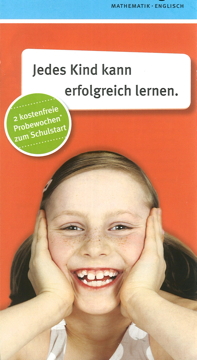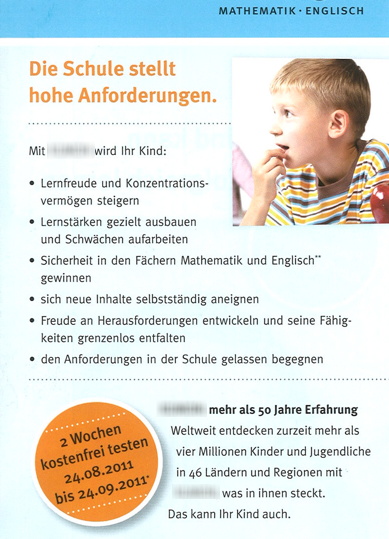“Private Nachhilfe” or after-school lessons as given in juku-like institutions, private tutoring at home, and all other forms of supplementary education has been the focus of an annual debate in Germany. Parents, education experts and politicians, who see this kind of “shadow education” as a result of shortcomings in schools, regularly express their concern about the growth of supplementary education.
Where once a school was able to guarantee children an education good enough to succeed in society, many parents now see the future of their children at risk due. The fear that the school system is not changing quickly enough or at least not in the right direction to meet the challenges of the 21stcentury leads to more private agitation.
Naturally, demands for responses focus on schools’ accountability. To do so, reforms of the educational system are necessary and were implemented over the past few years – mainly as a result of the bad performance of German pupils in PISA 2000. In general, PISA has led to an unbelievable amount of research activities.
What is often forgotten is the fact that research focused not just on the assumed failures of schools is needed, but also about Nachhilfe, which was also the topic of a lot of discussions.
For some years the German media is now bringing up the problem of Nachhilfe but except a few regionally specific social scientific projects no national or even comparative study has been carried out.
In the end, not all the debates about concerns towards this kind of education were pointless.
Finally, in 2007 the government reacted and the BMBF, the German Federal Ministry for Education and Research, commissioned a report. Shortly after, the selected private research institution, the FiBS (Institute for Education and Socio-Economic Research and Consulting), came up with a survey of over 169 pages summing up all the available data about forms of commercial Nachhilfe, data records about offering institutions and an international overview about comparable data including Austria, England, Poland, Japan and South Korea.
The survey was titled with: “What do we know about Nachhilfe? – Status and Examination of Research Literature about Offering, Need and Effect” (in German).
All in all, the education experts of the FiBS stated, that the current state of research was “fragmentary” or rather “confusing” (p. 12) and so a lot of work has to be done until we can fully understand how we – in political as well as societal terms – have to deal with this educational reality.
Clearly we will have to observe other Nachhilfe-systems around the world to see what concepts seem promising to us for dealing with Shadow Education. Sadly not much was done after the FiBS report was published. While I myself am in the middle of a research project about Shadow Education in Germany and Japan, not much is done in German research institutes to see what is going on in Nachhilfe-institutions. Just one thing seems to be clear: Nachhilfe – or however you may entitle this kind of private tutoring – is expanding all over the globe. Last year FiBS started a survey about Nachhilfe in the G8-States and found out, that the need for supplementary education of this kind is growing steadily.
One reason for this – Nachhilfe institution operators themselves said so – are the school reforms mentioned above, e. g. the structural reform of the Gymnasium, where students don’t need to go to school for 13 years altogether (including 4 to 6 years of primary education) but just 12 years. Pressure in school has intensified and so more and more students (and parents) look for help – and they find it. If you follow FiBS, 58 % of institutional Nachhilfe offers stated that the request for their private after school lessons has steadily increased over the past few years.
I still hope for more research activity in this field of study and am happy, that the BMBF has already included a section about out-of-school learning in the national report on education as a result of the FiBS report. We do know that Nachhilfe exists and is expanding; we just have to understand how to deal with this fact in the present and the future as well.
Links:
BMBF: http://www.bmbf.de/press/2289.php
FiBS: http://www.fibs.eu/en/index.htm
Bildungsbericht: http://www.bildungsbericht.de/zeigen.html?seite=8400




